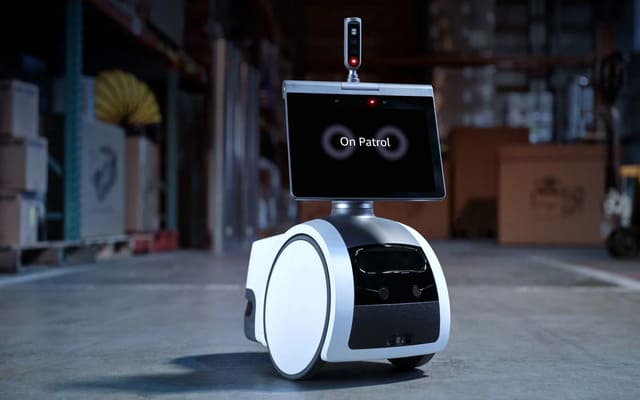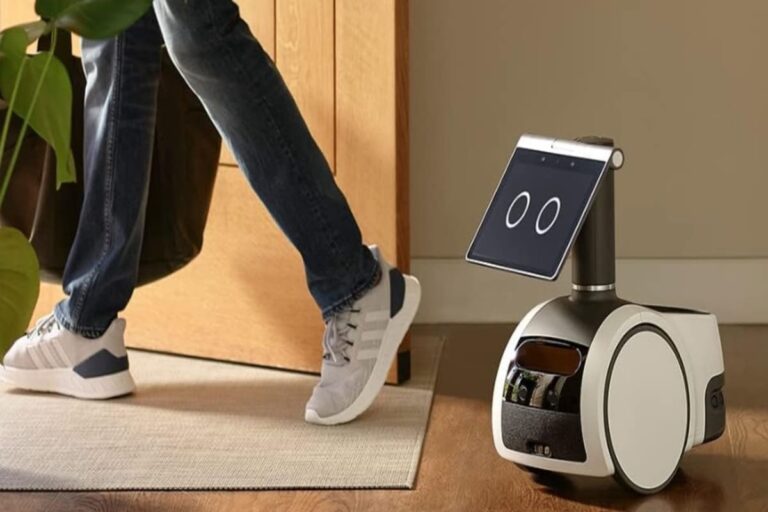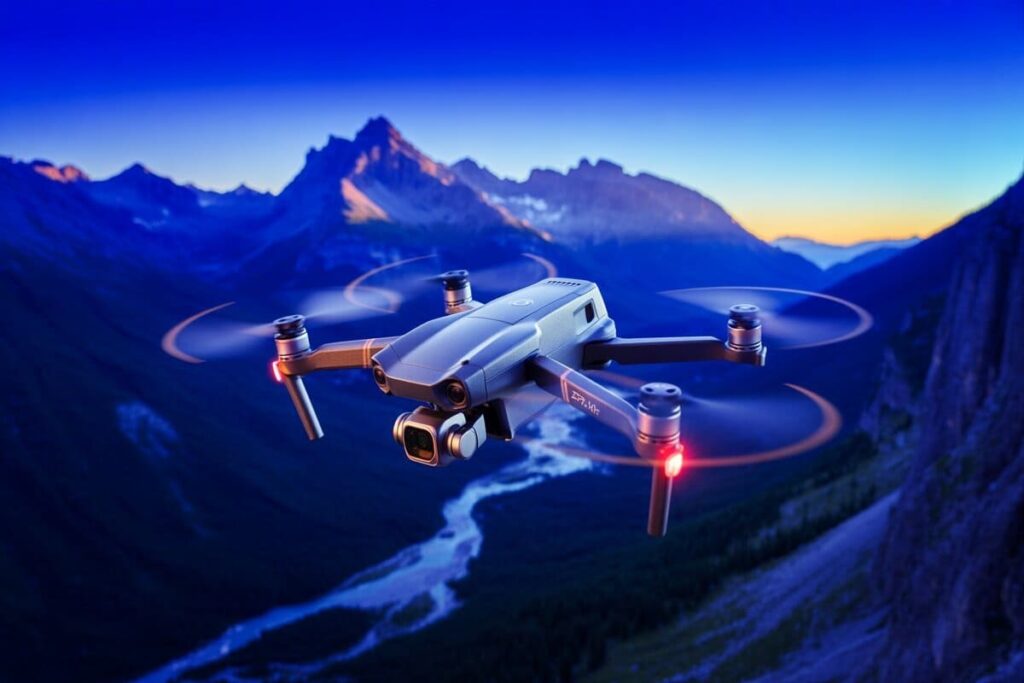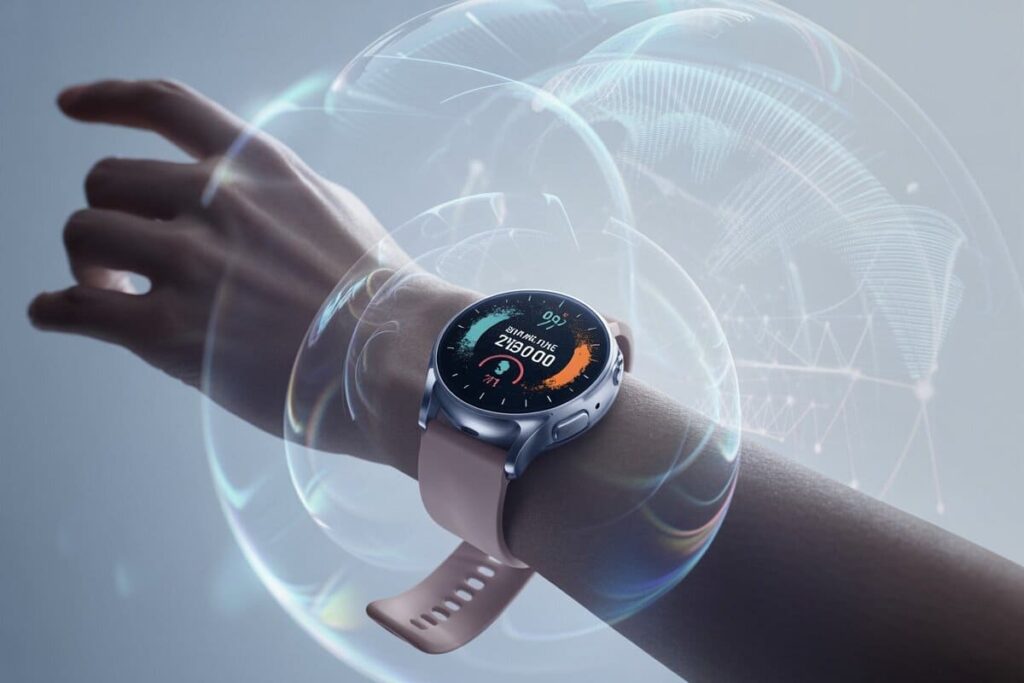The Amazon Astro, first unveiled in 2021, promised to bring a sci-fi vision of home robotics to life.
Marketed as a household assistant with Alexa on wheels, it combines home monitoring, entertainment, and task automation in a compact, WALL-E-inspired package.
In 2025, the Astro remains an invite-only “Day 1 Edition” product, priced at $1,599.99, sparking curiosity and skepticism among tech enthusiasts.
This review dives into its features, performance, privacy concerns, and value to determine if the Astro lives up to the hype for American consumers seeking a futuristic home companion.
Design and Build: Cute but Limited
The Astro’s design is undeniably endearing, standing at 17 inches tall with a 10.1-inch HD touchscreen displaying animated “eyes” that give it a pet-like personality.
Its two large front wheels and a smaller rear wheel allow it to zip around at up to 2.2 mph, navigating homes with ease.
A periscopic HD camera with night vision extends for better views, and a 2 kg cargo bin can carry small items like drinks or snacks.
Built with a mix of plastic and metal, it feels sturdy but not indestructible, especially at its premium price point.
- Pros: Compact (16.7 x 9.8 x 17.3 inches), lightweight (20.6 lbs), expressive screen, USB-C port for charging devices.
- Cons: Fragile for a floor-dwelling robot, no stair navigation, limited cargo capacity.
The Astro’s aesthetic, reminiscent of The Jetsons’ dog, makes it a conversation starter, but its inability to climb stairs or handle rugged surfaces (like thick carpets) limits its utility in multi-level or cluttered homes.
Amazon Astro Robot – Features: A Mix of Innovation and Gimmicks
Powered by Alexa and running on Fire OS and Linux, the Astro blends smart display functionality with robotic mobility. Its key features include:

- Home Monitoring: Paired with a Ring Home Premium subscription ($10/month), Astro patrols autonomously, detects unrecognized faces, glass breaking, or smoke alarms, and saves footage for up to 180 days. Users can remotely control it via the Astro app (iOS/Android) for live views or to check specific areas.
- Task Automation: Responds to commands like “Astro, follow me,” “Take this to the kitchen,” or “Check the front door.” It delivers reminders, plays music, or streams shows while trailing you.
- Pet and Family Care: Records short videos of pets and sends notifications. With Alexa Together ($19.99/month), it monitors elderly family members, detecting inactivity or falls and alerting caregivers.
- Entertainment: Astro dances, imitates animals (e.g., chickens or whales), or plays games like hide-and-seek, adding playful charm for kids and adults.
The Intelligent Motion system, using sensors and AI, maps homes dynamically, avoiding obstacles like pets or furniture.
Setup takes about an hour, though reflective surfaces or cluttered spaces can confuse its mapping process.
Performance: Functional but Flawed
After testing the Astro in a 1,500 sq. ft. single-level home, its performance is a mixed bag.
Navigation is impressive—it deftly avoids obstacles and returns to its charger autonomously, rarely running out of battery (lasting ~8 hours of active use).
The periscopic camera provides clear 1080p footage, even in low light, and the two 55mm speakers deliver decent audio for music or video calls.
However, limitations are evident:
- Mapping Issues: In homes with mirrors or glass doors, Astro occasionally gets disoriented, requiring manual recalibration.
- Command Reliability: Voice recognition via Alexa is solid, but complex commands (e.g., “Take this to Mom in the study”) fail if faces or rooms aren’t pre-registered.
- Cargo Utility: The 2 kg bin is handy for small items but impractical for anything heavier or oddly shaped.
- Subscription Dependency: Advanced features like autonomous patrolling or cloud storage require a Ring Home Premium subscription, inflating costs.
Compared to a static Echo Show 10 ($249.99), Astro’s mobility adds value, but its tasks don’t feel revolutionary enough to justify the price.
Privacy: A Double-Edged Sword
Privacy is a major concern with a camera-equipped robot roaming your home. Amazon addresses this with:
- A physical mic/camera off button that disables sensors and halts movement.
- Customizable “out-of-bounds zones” in the Astro app to restrict access to private areas.
- On-device processing for facial recognition (Visual ID), with data stored locally.
However, Astro’s integration with Ring and Alexa raises red flags.
Cloud-stored patrol videos and constant Alexa listening (unless disabled) feed Amazon’s ecosystem, which has a controversial history of data handling
Users comfortable with smart home devices may accept this trade-off, but privacy-conscious consumers might hesitate.
Price and Availability: A Barrier to Entry
At $1,599.99 (up from $999.99 for early adopters), Astro is a luxury purchase. It includes a year of Ring Protect Pro or Alexa Together, but ongoing subscriptions add $120-$240 annually.
Availability remains restricted to an invite-only program in the U.S., requiring a survey and Amazon approval, which limits access and suggests ongoing beta testing.
For context, a Ring Stick Up Cam Battery ($99.99) plus an Echo Show 8 ($149.99) offers similar monitoring and Alexa features for a fraction of the cost, albeit without mobility.
Astro’s price feels steep for its current capabilities, especially when robot vacuums like the iRobot Roomba j9+ ($899.99) offer more practical home automation.
The Business Pivot: A Warning Sign?
In 2024, Amazon discontinued the Astro for Business model just seven months after its $2,349.99 launch, citing low adoption and a shift to focus on the home version.
This move raises concerns about Astro’s long-term viability.
While Amazon promises future updates for the home Astro, the business model’s failure suggests the robot may struggle to find a broad market.
Who Is Amazon Astro Robot For?
- Tech Enthusiasts: Early adopters who love cutting-edge gadgets and can afford the price will enjoy Astro’s novelty.
- Smart Home Devotees: Those deep in Amazon’s ecosystem (Ring, Alexa) will appreciate its integration.
- Pet Owners or Caregivers: Astro’s pet monitoring and elderly care features are compelling for specific needs.
It’s less ideal for:
- Budget Buyers: The high cost and subscriptions make it inaccessible for most.
- Privacy Hawks: Constant data collection may feel invasive.
- Multi-Level Home Owners: No stair navigation limits its scope.
Verdict: Hype Meets Reality
The Amazon Astro Robot is a fascinating glimpse into the future of home robotics, blending Alexa’s smarts with mobility and charm.
Its home monitoring, pet care, and entertainment features work well, and its autonomous navigation is impressive for a consumer robot.
However, at $1,599.99 plus subscriptions, it’s hard to justify for most households. Mapping glitches, limited utility, and privacy concerns temper the excitement, and the invite-only model feels like a prolonged beta test.
Pros:
- Endearing design and personality
- Solid navigation and home monitoring
- Useful for pet and elderly care
- Seamless Alexa integration
Cons:
- Exorbitant price and subscription costs
- Limited practical tasks
- Privacy concerns with data collection
- Invite-only access and mapping issues
Final Score: 6.5/10
The Astro is a fun, futuristic toy for Amazon loyalists with deep pockets, but it’s not yet the game-changing assistant promised.
Wait for a wider release, price drop, or more robust features before taking the plunge.
Curious about Astro? Request an invite on Amazon’s site and weigh the hype for yourself!





